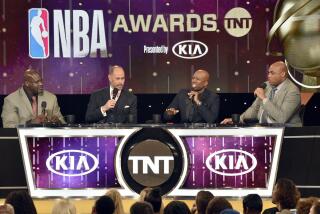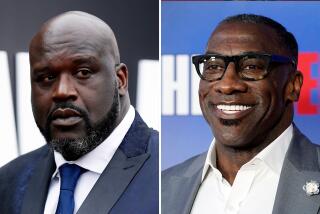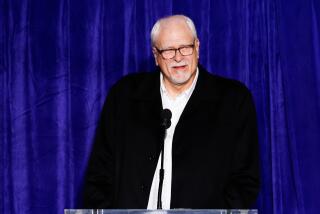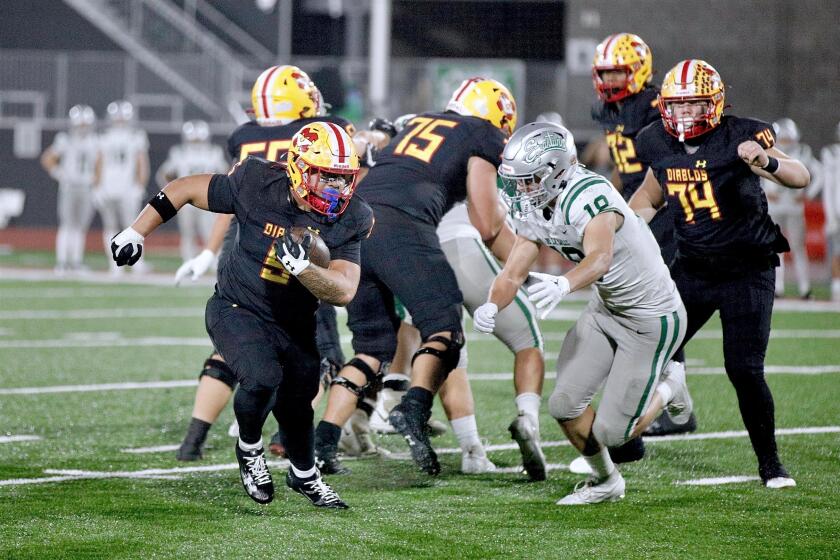TOUGH LOVE
Sarge?
“Who you calling Sarge? It ain’t Sarge, it’s Phillip!”
OK, um, Phillip?
“Who are you? What’s your name!”
My name is . . .
“What do you do? What do you want?”
You take a deep breath.
You explain to Phillip Harrison that you would like to interview the man behind the mountain.
You say you would like insights from the man cited by Shaquille O’Neal as his toughest but most important teacher; the rod-toting father who helped raise him since he was 3; the infamous “Sarge.”
Considering Laker fans have yet to hear from this near-mythical figure during Shaq’s four years here--and now that he is squinting at you from the edge of a Staples Center seat--you wonder if Sarge could describe his legendary discipline.
Not that you haven’t just gotten a pretty good idea.
“Go on, talk!”
Yes, sir.
*
A story, straight from the Sarge’s mouth.
Shaquille O’Neal was 10, hanging out with a bad crowd at his New Jersey elementary school.
Sarge--for 21 years he served in the U.S. Army--received a phone call at work.
It was the police, saying that Shaq and some friends had set off a fire alarm at school.
Sarge was working at a base gym. He grabbed a paddleball paddle and jumped in the car.
“The cops saw me when I came through the door and they said, ‘If you hit him, we’re going to lock you up!’ ” Sarge recalled. “I told them, ‘Then lock me up right now!’ ”
Sarge said he took Shaq into a room and “tore his butt up” with the paddle.
“I told him, better I do it now than have the police do it later,” Sarge recalled. “I told him, you’ve got to be a leader, not a follower.”
Another story, 18 years later.
Last month, immediately after Shaq learned he had been voted the NBA’s most valuable player, he phoned his father.
“Daddy,” he said, and he was crying.
*
The first thing to understand about Sarge and Shaquille O’Neal, perhaps, is that we are not supposed to understand.
One is father, the other is a son, and maybe that should be explanation enough.
Some would think, especially in today’s climate, that Sarge’s disciplinary methods would qualify as abuse.
Shaq--who may be the kindest, gentlest giant star in sports today--is not one of them.
“My father did what he had to do,” he said Thursday after leading the Lakers to a Game 1 victory over the Indiana Pacers in the NBA finals. “I did a lot of stupid things growing up. Everything he did, he did for a reason.”
Some would think that Sarge’s methods might have been counterproductive, leaving his son angry and rebellious, the stereotypical military brat.
Shaq--who is actually a better citizen than basketball player--is not one of them.
“My dad wanted me to be better than him, to go farther than him,” he said. “He was doing it all for me. I love him for that.”
Sarge clearly loves him back.
“My son lives within me, and I live within him,” said the bespectacled 6-foot-5 man in a rare moment of softness.
Blood runs between them, though scientists may claim there is not. Sarge became Shaq’s father by marrying Shaquille’s mother, Lucille.
“What do you mean, stepson?” Sarge booms. “Bull! No such thing! You love the mother, you love the child, you raise the child. I would die for my family.”
He’s already doing the second-hardest thing, which is staying away from Los Angeles because he thinks his presence is a distraction.
His visit to Staples Center on Wednesday was his first this season. In Shaq’s previous three years in Los Angeles, he attended about one Forum game a year.
After causing a stir by becoming deeply involved in his son’s career in Orlando--he would even wave placards in the stands reminding free-throw-shooting Shaq to “Bend Your Knees”--Sarge has since backed away.
“Shaq doesn’t need to see me so much, it makes him nervous, he tries too hard to please me,” Sarge said. “If he sees me in the stands, I move somewhere so he can’t.”
Sarge still attends most Laker games in his former San Antonio home, and in Orlando, near where he lives.
And he still keeps in constant touch. Said Shaq: “We talk almost every day.”
Said Sarge: “Every game, win or lose, I’m either talking to him or sending him a message. I feel what he’s feeling, and he feels what I’m feeling.”
Sometimes Sarge doesn’t wait until the end of the game.
In one of the more uncomfortable moments of the season, Sarge yelled at Phil Jackson to take Shaq out of the season’s final game in San Antonio when it became apparent the Spurs were going to start taking cheap shots.
In one of the more quietly amazing moments of the season, in the third quarter of Game 7 Sunday against Portland, Sarge paged Shaq’s bodyguard, Jerome Crawford, during the third quarter.
His son was struggling. He wanted Crawford, who sits behind the Laker bench, to pass along a message.
“I told Jerome to tell Shaq, ‘Relax, take your time, you’re going to be fine,’ ” Sarge said. “I could see on TV what he was feeling.”
And when Shaq stepped up for those two free throws in the final minutes?
“I knew they were both going in,” Sarge said. “Like I said, we feel each other.”
It wasn’t always like that.
Another Sarge story.
Shaq was 13, in high school in Germany. It was parent-teacher conference day.
The teachers told Sarge that his son was playful, fun, sweet.
“But they also said he wasn’t taking care of business,” Sarge recalled. “They said he was break-dancing in shop class.”
We hear that today and laugh. Sarge heard it then and fumed.
He excused himself and his son. He took Shaq to the bathroom.
“Once we got inside, I beat his ass,” Sarge said. “Then I sent him back to the classroom crying.”
At this point in the story, Sarge’s voice grew soft again.
“But you know something?” he said. “That was the last time I ever had to do that to my son. The last time. After that, he grew up.”
Shaq grew up such that Sarge likes to tell another story, about the time Shaq’s San Antonio high school won the Texas state basketball championships.
Shaq and friends went out that night to celebrate, but he strangely returned home early.
“He said he had forgotten to tell me when he was coming home, so he came home to tell me,” Sarge said. “That was special.”
There is much about Shaq that fits into that category.
For all of his strength under the basket, we marvel at his softness with children.
“I always taught Shaq, be nice to everyone on your way up, because you’ll see them on the way down, only faster, because big men fall harder,” Sarge said.
For all his mumbling during interviews, Shaq is generally available to the media even under the worst of circumstances, taking the pressure off his teammates.
“He once missed a game-winning shot in college, and ran to the bathroom to cry,” Sarge recalls of Shaq’s days at Louisiana State. “I followed him in there and pulled him out and told him he had to face defeat like a man.”
And for all his bragging about meeting Scottie Pippen in the street, about abusing Arvydas Sabonis in the paint, about Superman this and Superman that, we marvel at Shaq’s respect for the authority of coaches and referees.
“Respect your elders, period, that was the lesson,” Sarge said. “Just because you’re big doesn’t make you an authority.”
In the past, it has been written here that sometimes Shaq has too much respect for his elders, especially when he should be the elder.
In the past, for as much as Sarge’s controversial hand seems to have molded Shaq into a fine adult, it may have also allowed him to remain a little boy.
This season, all that began to change. Shaq is no longer merely the biggest player on the court, he’s acting like it.
He’s not only the team’s leading scorer, he’s becoming the team’s leader.
Credit natural maturity. Credit Phil Jackson’s psychological move of naming Shaq the boss and challenging him to live up to it.
But, as always, Shaq will also credit Sarge.
“So he yelled at you, huh?” he says, shrugging, his giant shoulders nearly touching his little smile.
*
Bill Plaschke can be reached at his e-mail address: [email protected].
More to Read
Go beyond the scoreboard
Get the latest on L.A.'s teams in the daily Sports Report newsletter.
You may occasionally receive promotional content from the Los Angeles Times.











